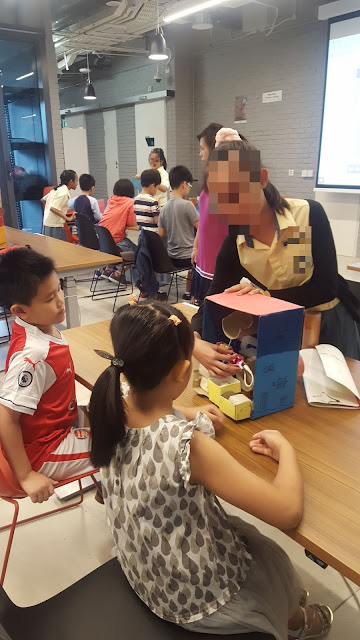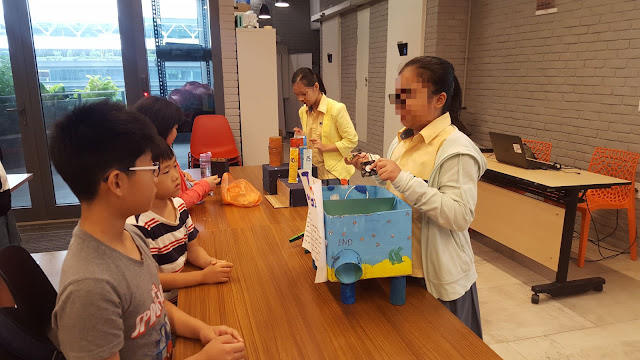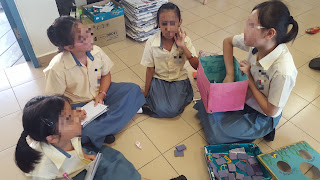Tabs under construction!
Showing posts with label electronics. Show all posts
Showing posts with label electronics. Show all posts
Monday, November 4, 2019
Monday, October 28, 2019
Art Class: Applied Learning Programme (ALP)
Hi teachers! The ministry recently announced that all primary schools would have an ALP by 2023. I'm happy to be involved in my school's ALP this year and the students have just completed the project. Throwback to last year, the art club students created their game project with similar concept using Littlebits so at least I have an inkling of where this is heading. The initial part of the current project incorporated design thinking guided worksheet for students to generate ideas. For a start, the students used collaborative card game for group discussion. Then, they meddled with raw electronic components to understand more about circuits.
The students brought their coded Microbits to art class to give them a makeover. Recycled materials and hot glue were used to fix the cardboard pieces.
The students had to write their scripts first to prepare for the presentation. My colleagues, D and F, recorded their presentations so that the teachers can review their projects. These videos will help the following year's students to have a better idea of what they will be doing.
A school-wide approach of such a project uses a lot communication with different channels. Collaboration would hardly happen if left it to chance. I hope by documenting my work, I can see how certain processes can be refined or have been overlooked when I revisit the materials in the future.
Labels:
artclass,
electronics,
microbits
Monday, July 23, 2018
Art Club: Children's Workshop by Children
2 weeks ago, art club pupils conducted a workshop for children at a community library. Each of them had the opportunity to present their year-long project of making a DIY game incorporating LittleBits components. The participants also got to bring home their own LED paper twirler. It was a pity some participants did not turn up due to the morning shower. Nevertheless, it was a comfortable group that the children were able to handle. At the end of the workshop, some of them slumped on the chair and exclaimed that it was SO TIRING to teach the younger ones. Talk about teachers' routines... I'm sure the children would internalise the concept of delayed gratification.
Last, a BIG shout out to my colleague, Candice, for sending the children's bulky artwork to the library and back to school!
Last, a BIG shout out to my colleague, Candice, for sending the children's bulky artwork to the library and back to school!
Labels:
artclub,
ArtSci,
electronics,
littlebits,
workshop
Tuesday, April 10, 2018
Art Club: Game Makers Survey
When I was a student, my Math tutor, Dr Yeap Ban Har, told us that teachers often tell him that they don't have enough time. He advised us to look at the whole curriculum and be a more effective teacher. For example, in the lower primary Math curriculum, the topic of Time doesn't have to start only when it is time to do so according to the curriculum timeline, we can start at the beginning of the school year by applying in daily situations. I shared this tip with my students' parents on a blog here many years ago.
My English tutor, Dr Babara Spilchuk, was equally inspiring. She taught us similar concept to integrate the arts by making books, writing stories and sharing with each other. The material cost was modest yet kept us, young adults, deeply engaged and hungry for more. One thing that irks her is worksheets. She rejected worksheets, didn't believe in it and so we didn't receive any during her class. We spend a lot of time creating, reading and held discussions in her class.
I grew up consuming worksheets so Dr Spilchuk's class felt more like a visual art class than an English class. After all, my mental schema of an English class was books and worksheets and booklets compiled with photocopied papers.
I guess my tutor was role modelling for us not get too comfortable with a teaching style. She was also showing us that knowledge doesn't exist in isolation. After all, an integrated school curriculum has the potential to alleviate the problems of curriculum overload and fragmentation. As teachers, we can focus on the relationships between subjects to promote learning that applies to several disciplines concurrently and it may allow us to streamline curriculum.
Both my tutors' teaching has somehow urged me to conduct my mini research on integrated learning. The art club pupils have started this project since Term 4 last year. To get a sense of their readiness and their current state of mind about their projects, I conducted a survey. Below is a snapshot of one of the open-ended questions:

Finally, I would like the P3 art club children to experience interacting with this group of game makers so they were given instructions to approach any game maker groups and ask any questions they like. They were given a PQP (Praise, Question, Polish) feedback form to evaluate their chosen game maker group and to provide written feedback after their interaction.
My English tutor, Dr Babara Spilchuk, was equally inspiring. She taught us similar concept to integrate the arts by making books, writing stories and sharing with each other. The material cost was modest yet kept us, young adults, deeply engaged and hungry for more. One thing that irks her is worksheets. She rejected worksheets, didn't believe in it and so we didn't receive any during her class. We spend a lot of time creating, reading and held discussions in her class.
I grew up consuming worksheets so Dr Spilchuk's class felt more like a visual art class than an English class. After all, my mental schema of an English class was books and worksheets and booklets compiled with photocopied papers.
I guess my tutor was role modelling for us not get too comfortable with a teaching style. She was also showing us that knowledge doesn't exist in isolation. After all, an integrated school curriculum has the potential to alleviate the problems of curriculum overload and fragmentation. As teachers, we can focus on the relationships between subjects to promote learning that applies to several disciplines concurrently and it may allow us to streamline curriculum.
Both my tutors' teaching has somehow urged me to conduct my mini research on integrated learning. The art club pupils have started this project since Term 4 last year. To get a sense of their readiness and their current state of mind about their projects, I conducted a survey. Below is a snapshot of one of the open-ended questions:
Next, a collaboration google document with the template below allows all the children to respond to my questions and their friends' comments together. They are also able to read other people's responses that would polish their train of thoughts and written comments. Below is a snapshot of one of the groups' inputs:

Finally, I would like the P3 art club children to experience interacting with this group of game makers so they were given instructions to approach any game maker groups and ask any questions they like. They were given a PQP (Praise, Question, Polish) feedback form to evaluate their chosen game maker group and to provide written feedback after their interaction.
Labels:
artclub,
ArtSci,
electronics,
surveys
Monday, March 26, 2018
Art Club: Game Makers
This is such an apt scene from our community library - A robotic book drop. It travels along a guided path using sensors and it stops near the entrance to allow visitors to drop their returned books. Then it goes into a staff-only room where people will empty its bin and it comes out only for the cycle to repeat itself. Save the humans from the monotonous chores and hard labour.
The children are encouraged to read more to deepen their understanding of electronics. A list of books available in the public library is compiled for them. There were a lot of group discussion in the process and the projects were written as ideas first. I'm looking forward to sharing their survey result and thinking about collating their thought process.
 |
| Batteries Storage |
Labels:
artclub,
ArtSci,
batteries,
electronics,
housekeeping
Sunday, October 15, 2017
Art Club: Game Makers
Electronics are all around us. Take this wireless food buzzer for example. I took a photo of this at a food court. Its interior was exposed revealing the circuit board. We had a discussion of the function of electronics and its impact on people's lives.
Then the children worked on their ArtScience Project. To put it simply, they have to create a game that incorporates at least one art theory and one science principle that they have learnt in their regular classes. In the beginning, they were just introduced to a variety of raw electronic components and without detailed instructions, they experimented with closed circuits to acquire tangible results (e.g. lighting LEDs, turn on a small fan, buzzer, vibrators). The homogeneous groupings ensure that children from cross level and classes have opportunities to interact and exchange ideas. Subsequently, they were introduced to a more advanced electronics package to concretise their ideas. The children also had a scribe to document, plan and reflect on their ideas so that I can visualise their plans (games).
Labels:
artclub,
ArtSci,
circuits,
electronics,
gamemakers
Wednesday, June 21, 2017
Subscribe to:
Comments (Atom)















































